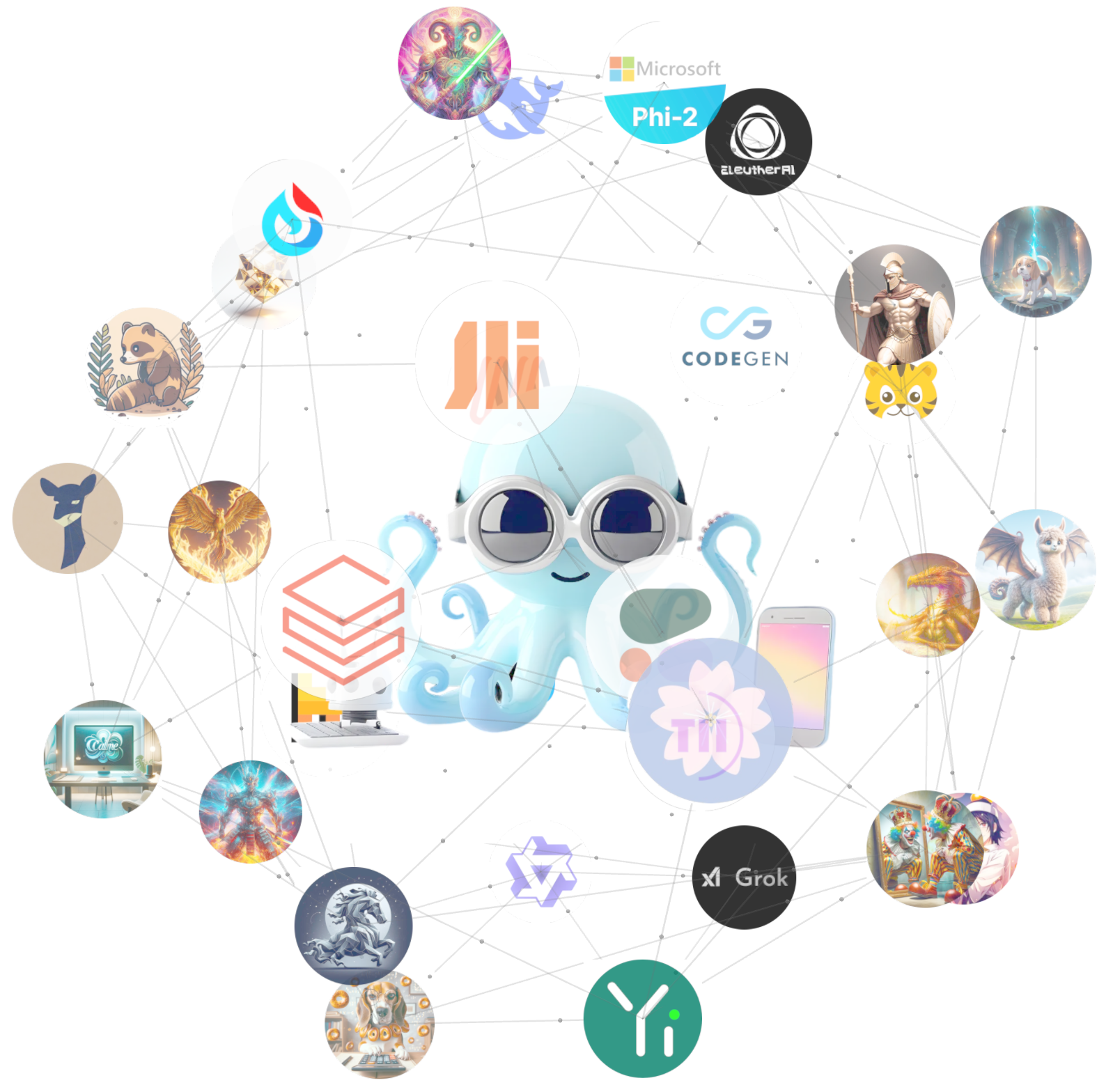metadata
language:
- en
license: cc-by-nc-4.0
model_name: Octopus-V4-GGUF
base_model: NexaAIDev/Octopus-v4
inference: false
model_creator: NexaAIDev
quantized_by: Nexa AI, Inc.
tags:
- function calling
- on-device language model
- gguf
- llama cpp
Octopus V4-GGUF: Graph of language models
- Original Model - Nexa AI Website - Octopus-v4 Github - ArXiv - Domain LLM Leaderbaord
Acknowledgement:
We sincerely thank our community members, Mingyuan and Zoey, for their extraordinary contributions to this quantization effort. Please explore Octopus-v4 for our original huggingface model.
Get Started
To run the models, please download them to your local machine using either git clone or Hugging Face Hub
git clone https://huggingface.co/NexaAIDev/octopus-v4-gguf
Run with llama.cpp (Recommended)
- Clone and compile:
git clone https://github.com/ggerganov/llama.cpp
cd llama.cpp
# Compile the source code:
make
- Execute the Model:
Run the following command in the terminal:
./main -m ./path/to/octopus-v4-Q4_K_M.gguf -n 256 -p "<|system|>You are a router. Below is the query from the users, please call the correct function and generate the parameters to call the function.<|end|><|user|>Tell me the result of derivative of x^3 when x is 2?<|end|><|assistant|>"
Run with Ollama
Since our models have not been uploaded to the Ollama server, please download the models and manually import them into Ollama by following these steps:
- Install Ollama on your local machine. You can also following the guide from Ollama GitHub repository
git clone https://github.com/ollama/ollama.git ollama
- Locate the local Ollama directory:
cd ollama
- Create a
Modelfilein your directory
touch Modelfile
- In the Modelfile, include a
FROMstatement with the path to your local model, and the default parameters:
FROM ./path/to/octopus-v4-Q4_K_M.gguf
PARAMETER temperature 0
PARAMETER num_ctx 1024
PARAMETER stop <nexa_end>
- Use the following command to add the model to Ollama:
ollama create octopus-v4-Q4_K_M -f Modelfile
- Verify that the model has been successfully imported:
ollama ls
- Run the model
ollama run octopus-v4-Q4_K_M "<|system|>You are a router. Below is the query from the users, please call the correct function and generate the parameters to call the function.<|end|><|user|>Tell me the result of derivative of x^3 when x is 2?<|end|><|assistant|>"
Dataset and Benchmark
- Utilized questions from MMLU to evaluate the performances.
- Evaluated with the Ollama llm-benchmark method.
Quantized GGUF Models
| Name | Quant method | Bits | Size | Respons (token/second) | Use Cases |
|---|---|---|---|---|---|
| Octopus-v4.gguf | 7.64 GB | 27.64 | extremely large | ||
| Octopus-v4-Q2_K.gguf | Q2_K | 2 | 1.42 GB | 54.20 | extremely not recommended, high loss |
| Octopus-v4-Q3_K.gguf | Q3_K | 3 | 1.96 GB | 51.22 | not recommended |
| Octopus-v4-Q3_K_S.gguf | Q3_K_S | 3 | 1.68 GB | 51.78 | not very recommended |
| Octopus-v4-Q3_K_M.gguf | Q3_K_M | 3 | 1.96 GB | 50.86 | not very recommended |
| Octopus-v4-Q3_K_L.gguf | Q3_K_L | 3 | 2.09 GB | 50.05 | not very recommended |
| Octopus-v4-Q4_0.gguf | Q4_0 | 4 | 2.18 GB | 65.76 | good quality, recommended |
| Octopus-v4-Q4_1.gguf | Q4_1 | 4 | 2.41 GB | 69.01 | slow, good quality, recommended |
| Octopus-v4-Q4_K.gguf | Q4_K | 4 | 2.39 GB | 55.76 | slow, good quality, recommended |
| Octopus-v4-Q4_K_S.gguf | Q4_K_S | 4 | 2.19 GB | 53.98 | high quality, recommended |
| Octopus-v4-Q4_K_M.gguf | Q4_K_M | 4 | 2.39 GB | 58.39 | some functions loss, not very recommended |
| Octopus-v4-Q5_0.gguf | Q5_0 | 5 | 2.64 GB | 61.98 | slow, good quality |
| Octopus-v4-Q5_1.gguf | Q5_1 | 5 | 2.87 GB | 63.44 | slow, good quality |
| Octopus-v4-Q5_K.gguf | Q5_K | 5 | 2.82 GB | 58.28 | moderate speed, recommended |
| Octopus-v4-Q5_K_S.gguf | Q5_K_S | 5 | 2.64 GB | 59.95 | moderate speed, recommended |
| Octopus-v4-Q5_K_M.gguf | Q5_K_M | 5 | 2.82 GB | 53.31 | fast, good quality, recommended |
| Octopus-v4-Q6_K.gguf | Q6_K | 6 | 3.14 GB | 52.15 | large, not very recommended |
| Octopus-v4-Q8_0.gguf | Q8_0 | 8 | 4.06 GB | 50.10 | very large, good quality |
| Octopus-v4-f16.gguf | f16 | 16 | 7.64 GB | 30.61 | extremely large |
Quantized with llama.cpp
